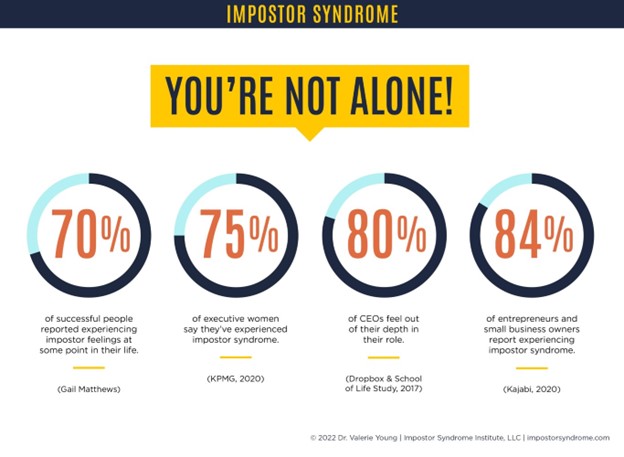Imposter Syndrome refers to the persistent feeling of doubt in your own abilities, accompanied by a sense of being a fraud or inadequate in your role or position. Despite evidence to the contrary, individuals experiencing imposter syndrome may struggle to recognize their own accomplishments and even that they deserved that promotion to leadership. For some, it just lingers there eating away before we either overcome or succumb to it, leading to an impact on both professional and personal aspects of life.
If you haven't experienced imposter syndrome, this article will provide valuable insights for you as a leader to support others who may be dealing with it. For those currently experiencing imposter syndrome, I hope my own story helps to share how I was able to crawl out of it.
Transitioning into a leadership role can be both exciting and daunting. The added responsibilities and expectations can be overwhelming, and it's during this time that imposter syndrome can begin to take hold. I faced this myself when I took on a new role that required a combination of skills and the creation of a new division.
As I was adjusting through the first few months, I encountered setbacks and doubts about my abilities. The constant need to revise ideas and the lack of immediate progress started to chip down my confidence. It was at this point that imposter syndrome was creeping in. I wasn't able to hold it off, thoughts such as "I can't do this", "This is beyond my capabilities", "Maybe I should consider a different path" started to dominate my mindset.
However, I realized that the role I had taken on was aligned with my skills and experience. I acknowledged that my qualifications and capabilities should be enough to succeed in this role. Although imposter syndrome was still acting as a wave crashing down on those positive thoughts, I found a spark of confidence that helped me navigate through this challenging phase. This is where my journey started and I recommend the same starting point for you, by recognizing past achievements and acknowledging the skills and experiences that have brought you to where you are.
Data Collection Credit: Dr. Valerie Young

Recognize your Past Achievements
You have earned the role that you are in. Acknowledge and give yourself credit for the accomplishments and milestones you have achieved throughout your education, self-development, and career. These experiences and successes demonstrate that you have earned your current leadership role. Use these positive thoughts against the negative self-doubt of imposter syndrome. Reflecting on the efforts and dedication you have put in to reach this point can provide the necessary motivation to break through.
Keep Learning and Developing Yourself
Continuously learn and stay updated within your field to equip yourself with the knowledge and skills needed to tackle daily challenges. In my own experience, I immersed myself in educational best practices, sought out reviews from corporate learning experts, followed other professionals in the learning and development field to gather valuable tips, and practiced through role-playing simulated scenarios. This combination of learning activities helped build my confidence back up and assured me that I was moving in the right direction when making decisions. By consistently developing your knowledge, you can turn the tide of imposter syndrome quickly and with conviction.
Lean on Your Strengthens
When imposter syndrome has a grip on you, leverage your areas of strength. Focus on the aspects of a project or task that you excel at. We all have unique skills and talents, even when imposter syndrome clouds our judgment. By relying on these specific strengths, you can cut through the self-doubt and achieve daily victories that confirm your capabilities.
Celebrate Milestones and Successes
Recognize and celebrate the smaller milestones and successes along your journey. Each accomplishment serves as evidence that you are capable and deserving of your role. Setting realistic milestone markers and celebrating them along the way can boost your confidence and provide a sense of achievement. Accumulating these small wins will help you overcome imposter syndrome and reinforce your belief in yourself.
Seek Mentorship
Having a mentor or coach can be immensely valuable as they can serve as guides and provide support. It's important to remember that imposter syndrome is common and can impact any one at any level, so a mentor may have had that experience to pull from. A mentor can share their own experiences, provide guidance on navigating obstacles, and offer encouragement.
Wrapping Up
Imposter Syndrome is an unwelcome companion on your path, whether experienced firsthand or observed in others. It should not be viewed as a badge of honor to be earned after emerging from its clutches. As a leader, your aim should be to help your team overcome imposter syndrome swiftly and to serve as a mentor they'll never forget. Additionally, as with my own personal experience, you may encounter imposter syndrome yourself. By sharing the steps I took, I hope you can conquer imposter syndrome expediently and concentrate on other crucial areas of growth, enabling you to continue rising in the leadership position you genuinely deserve.





